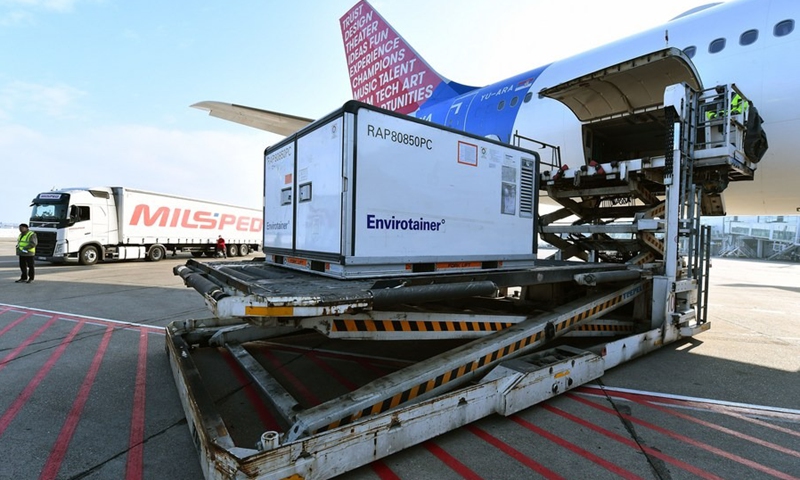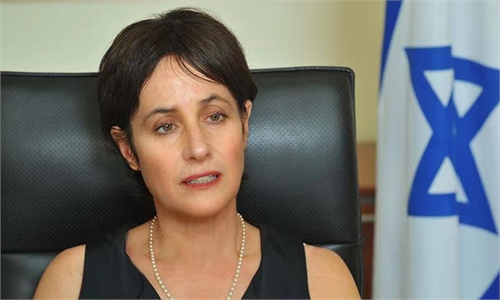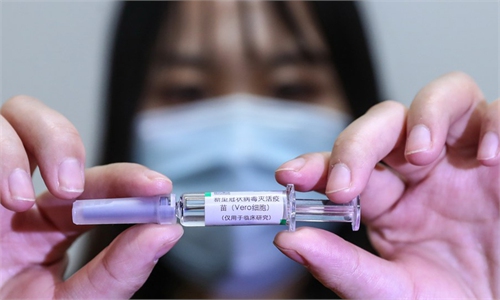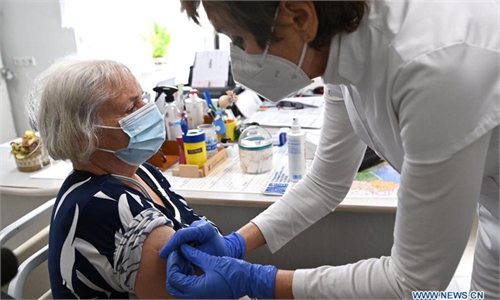Industry insiders refute ill-intended hype on early inoculation of Sinopharm Group's leaders, owe speed to mature technology, urgent situation
Nation takes safest way amid crisis, harvests speed and quality wins

Workers unload a container of China's Sinopharm inactivated coronavirus vaccines at the Belgrade Airport, Serbia, January 16, 2021. Photo: Xinhua
The recent disclosure by China's pharmaceutical giant Sinopharm Group boss Yu Qingming that some of the firm's leaders received the COVID-19 vaccine as early as March 2020, about three months after the outbreak started in Wuhan, Central China's Hubei Province, amazed many, while also prompting some ill-intended Western media hype of a conspiracy theory.
However, industry insiders and vaccine experts reached by the Global Times on Tuesday pointed out that such speedy vaccine progress is a result of China's mastering of mature inactivated vaccine technology and researchers' determination amid an urgent need at the early stage of the outbreak.
It is common to come up with a vaccine formula within few months worldwide, yet it is another story to prove its efficacy through prolonged clinical trials, they said.
Yu, who is also a deputy to the National People's Congress, China's top legislature, told the media on the sidelines of the ongoing annual two sessions that after a year of continuous tracking of the first group of Sinopharm vaccine recipients, their antibody levels were still high, without any obvious decline.
It takes much longer to prove a vaccine clinically than to simply develop one, Feng Duojia, president of the China Vaccine Industry Association, told the Global Times on Tuesday.
"It's actually very common for vaccine producers to develop a recipe for clinical trials in one to two months, but most of the time is spent on clinical trials," Feng said.
On February 1, 2020, the vaccines of Sinopharm received emergency approval of the Ministry of Science and Technology. On February 14, 2020, the research team obtained the purified antigen. Animal effectiveness tests began on February 16 last year and protective studies began on some 10 days later. Clinical registration for the production of the vaccine began on February 28, 2020.
"On March 18, 2020, three batches of vaccines were produced as required," Yang Xiaoming, the chief scientist of the vaccine project under China's national "863 Program," told the media recently, describing the vaccine's progress as an "effort of the entire nation."
Chinese drug regulators formally accepted Sinopharm's application for the market rollout of its COVID-19 vaccines in late December. The vaccine shows a 79.34-percent efficacy rate and a 99.52-percent antibody positive conversion rate.
Sinopharm produces a total of 50 kinds of vaccines for human use each year, with an annual output of more than 700 million doses, providing more than 80 percent of the vaccines in China's national immunization program.
Chinese vaccine producers have rich experiences in the field of coronaviruses, such as SARS and MERS, so it would not take too much time to develop a vaccine in the lab as long as they have the virus sequence, Feng noted.
Chinese scientists shared the genetic sequence of the novel coronavirus on January 11, 2020.
Vaccine researches have also been pushed fast in the West. The first clinical batch of mRNA-1273 was completed on February 7, 2020, a total of 25 days from sequence selection to vaccine manufacturing, according to data from Moderna's official website.
Chen Wei, a top infectious disease expert, whose team developed China's first one-dose COVID-19 vaccine, confirmed to China Central Television in February in an interview that she was the first person to be inoculated with the COVID-19 vaccine developed by her team on February 29, 2020.
"Our recombinant adenovirus vector vaccine will seem new to many people, but it is a mature technology for us… How can I recruit volunteers for clinical research if I'm afraid to use it myself?" Chen said. "Therefore, I led the team to receive the jab, which not only contributed to safety data in the early stage, but also gave courage to volunteers who participated in the world's first clinical study of the COVID-19 vaccine more than half a month later."
The vaccines, jointly developed by CanSino Biologics and researchers at the Institute of Military Medicine under the Academy of Military Sciences led by Chen, rolled out in February 2021. The phase I clinical trials started on March 16, 2020.
Tao Lina, a Shanghai-based vaccine expert, told the Global Times on Tuesday that it was China's safest choice to develop an inactivated vaccine to quickly cope with the virus at the initial stage of the outbreak.
Compared with chemical-based drugs, which undergo an unpredictable metabolic process in the human body, the inactivated vaccine's operational principle is to stimulate the immune system to evoke a response, said Tao.
"So the safety of the vaccine is quite certain, but the ultimate effectiveness needs to be verified through clinical trials on human beings," Tao said.
After the initial version of the vaccine was developed, Chinese researchers and some companies' leaders took the lead in inoculation, which was a matter of dedication, Tao said.
"Their actions proved the safety of the Chinese vaccines, which is more convincing than words," he said.
According to Yu, as of early March, Sinopharm had supplied nearly 100 million doses of the vaccines in China and overseas, and more than 80 countries and international organizations had sought to use Sinopharm's vaccines.
"Our production capacity can reach more than 1 billion doses in 2021 and is expected to reach 3 billion doses in the future, making it the world's largest manufacturer of COVID-19 vaccine," Yu said.
As of the end of February 2021, China had administered more than 52 million doses, reports said.




